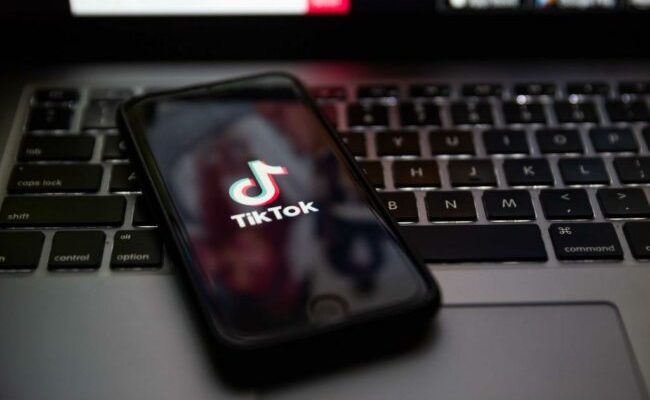
The video-sharing app has millions of users around the world but faces growing questions over the security of users’ data and its links to the government in Beijing.

The House of Representatives and Senate have now both passed legislation which, among other things, forces the platform’s parent company to divest.
President Joe Biden has vowed to sign the ban into law.
Why the ban on TikTok in the US?
Lawmakers from both major US parties have pressed for a law that bans TikTok unless ByteDance agrees to sell the app to a non-Chinese company.
They fear the Chinese government could force ByteDance to hand over data about TikTok’s 170 million US users. TikTok insists it would not provide foreign user data to the Chinese government.
On 21 April, House lawmakers approved a $95bn (£76bn) foreign aid bill with funds for Ukraine, Israel and Taiwan that also cleared the way for the forced sale of TikTok.
On 23 April, the legislation passed the Senate, and will now be sent to Biden to be signed into law.
The reasoning behind the proposed ban of TikTok in the US primarily revolves around;
Data Privacy:
Over time, there have been growing concerns that TikTok, owned by the Chinese company ByteDance, collects large amounts of user data, including personal information and browsing habits, which could potentially be accessed by the Chinese government.
National Security
Legislators and officials in the US have also expressed concerns that China may use TikTok for influence operations or espionage. They worry that the app’s ability to obtain private data about American users can be exploited for nefarious ends, endangering national security.
Regulatory Compliance
There are also concerns about TikTok’s compliance with US regulations regarding data protection and national security, with varying arguments that the company has not been transparent enough about how it handles user data and whether it adheres to US laws and standards.
Geopolitical Tensions
The proposed ban on TikTok occurs within the context of broader geopolitical tensions between the US and China. Issues such as trade disputes, technology competition, and human rights violations contribute to a contentious atmosphere in which the presence of Chinese-owned apps like TikTok is viewed with suspicion by some US policymakers.
Previous Executive Orders
Former President, Donald Trump signed executive orders in 2020 seeking to ban TikTok and WeChat, another Chinese-owned app, citing national security concerns. While these orders faced legal challenges and were not fully implemented, they reflect the US government’s stance on the perceived risks associated with Chinese-owned technology platforms.
These issues have led lawmakers and officials to question the presence of Chinese-owned apps in the American digital landscape and to consider measures to mitigate potential risks.
When could a TikTok ban happen?
Even after Biden signs the bill, the ban won’t take effect immediately.
It would likely take several years before Americans are unable to access the app, as ByteDance sues – likely to the Supreme Court – to block the forced sale.
Also, the legislation gives ByteDance nine months to sell TikTok to an American buyer, with an additional three-month grace period, before any ban would take effect. That means that the sale deadline would most likely come sometime in 2025 after the winner of the 2024 presidential election takes office.
How would the ban on TikTok work?
The most straightforward way for the US to ban TikTok would be to remove it from app stores, such as those operated by Apple and Google for iOS and Android devices.
App stores are how most people download apps onto their smartphones and tablets, so the ban would stop new users from getting TikTok.
That means people who already had the app would no longer be able to get future updates designed to improve security or fix bugs.
The US bill forbids applications controlled by US adversary countries from being updated and maintained in the US.
It gives broad powers to the president to limit apps with ties to Russia, China, Iran and North Korea.
What has TikTok said it will do about the legislation?
TikTok has been highly critical of the legislation, calling it an affront to the US right to free speech, with chief executive, Shou Zi Chew warning the bill would give “more power to a handful of other social media companies”, and put thousands of American jobs at risk.
ByteDance would have to seek approval from Chinese officials to sell TikTok, but Beijing has vowed to oppose such a move.
What has been the response from TikTok users in the US?
Some US creators and users have also criticised the proposed ban.
TikTok asked its 170 million US users to contact their political representatives and ask them not to support the bill.
But the deluge of “confused” calls from TikTok users to congressmen and senators may have backfired.
Several politicians say the campaign has worsened the concerns they have about the app, and strengthened their resolve to pass the legislation.
The users of TikTok would be significantly impacted by a prospective ban in the US. In general, a ban would deprive users of this platform for sharing and consuming content, impacting millions of users as well as content producers.
TikTok is more than simply a social media app for millions of Americans; it serves as a platform for social interaction, creativity, and entertainment. Users, particularly those in younger generations, depend on TikTok for a variety of material, such as instructional films, comedy skits, and dancing contests. Users would not be able to share or access content on this platform if it were banned.
TikTok has created thriving online communities throughout the years that are based on a variety of identities, interests, and pastimes. For many users, these networks offer a sense of support and belonging. These communities would be upended by a ban, which may cause them to split apart and lose important relationships that they had made on the platform.
Numerous people have been allowed to become influencers, entrepreneurs, and content creators because of TikTok. A lot of users have made a living and a profession out of using the site, generating revenue through sponsored content, brand alliances, and other forms of advertising. These opportunities would be compromised by a prohibition, which would deprive producers of a means of reaching their audience and making money.
While there are other social media platforms available, each offers a different user experience and community. Users who are accustomed to TikTok’s features and culture may find it challenging to transition to alternative platforms. Additionally, some users may not find a suitable alternative that fulfils their specific needs and interests.
The impact of a TikTok ban would extend beyond US borders, affecting international users who rely on the platform for entertainment, social networking, and cultural exchange. Many creators and users have built global followings on TikTok, contributing to its diverse and inclusive community.
If the bill becomes US law, it could inspire similar moves elsewhere.
TikTok is already banned in India, which was one of the app’s largest markets before it was outlawed in June 2020.
ALSO READ: Full list of countries that have banned TikTok with reasons
It is also blocked in Iran, Nepal, Afghanistan and Somalia.
The UK government and Parliament banned TikTok from staff work devices in 2023, as has the European Commission.
ALSO READ THESE TOP STORIES FROM NIGERIAN TRIBUNE







